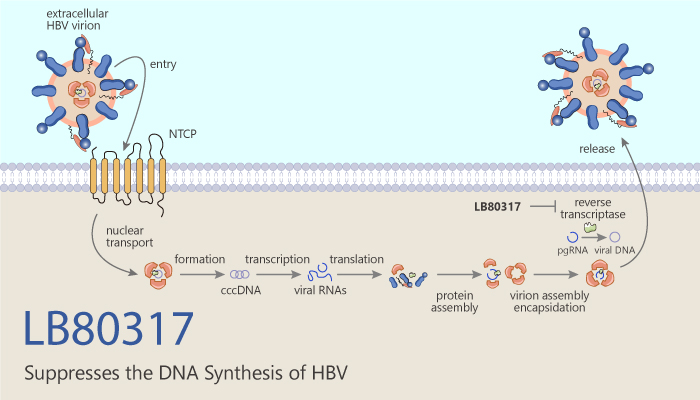Chronic hepatitis B (CHB) is a global endemic disease, and an estimated 400 million people have CHB in worldwide. Twenty-five to 40% of these chronically infected people eventually develop hepatocellular carcinoma and cirrhosis-related complications. All these facts make the treatment of CHB extremely important. There are some drugs for use for the treatment of CHB. They are two main categories: nucleoside/nucleotide analogs (NAs) and immunomodulators. However, there are some intrinsic limitations to all NAs. In this study, LB80380 is an oral nucleotide prodrug. It is chemically similar to Adefovir dipivoxil and Tenofovir disoproxil fumarate. LB80380 is a prodrug of LB80331 and LB80317.
Furthermore, LB80317 is the active metabolite with the antiviral effect. After phosphorylation to the di- and triphosphate forms, the molecule inhibits viral replication following incorporation into viral DNA. The main route of excretion is via the urinary system.

LB80317 is an active metabolite of LB80380 and suppresses the DNA synthesis of HBV. It has an antiviral effect and has the potential for chronic hepatitis B treatment. In in vitro studies using cell line models, the drug concentrations causing 50% reduction in HBV DNA with an EC50 of 0.5 μM for LB80317. In addition, forty percent of the amount of LB80331/LB80317 in the mouse liver is detected as the phosphorylated form. LB80380 is rapidly absorbed and converted to LB80331. Moreover, LB80317 has a long half-life at steady-state (T1/2=8.3-9.9 hours). Thus, LB80317 has a long half-life at steady-state, supporting the use of a once-daily dosing regimen.
In conclusion, LB80380, a dipivoxil ester prodrug of LB80331 (metabolite, LB80317), is an antiviral agent for chronic hepatitis B (CHB). LB80331, an active metabolite of LB80380, is a DNA polymerase inhibitor potentially for the potential treatment of hepatitis B virus infection.
Reference:
Man-Fung Yuen, et al. Antimicrob Agents Chemother. 2009 May;53(5):1779-85.